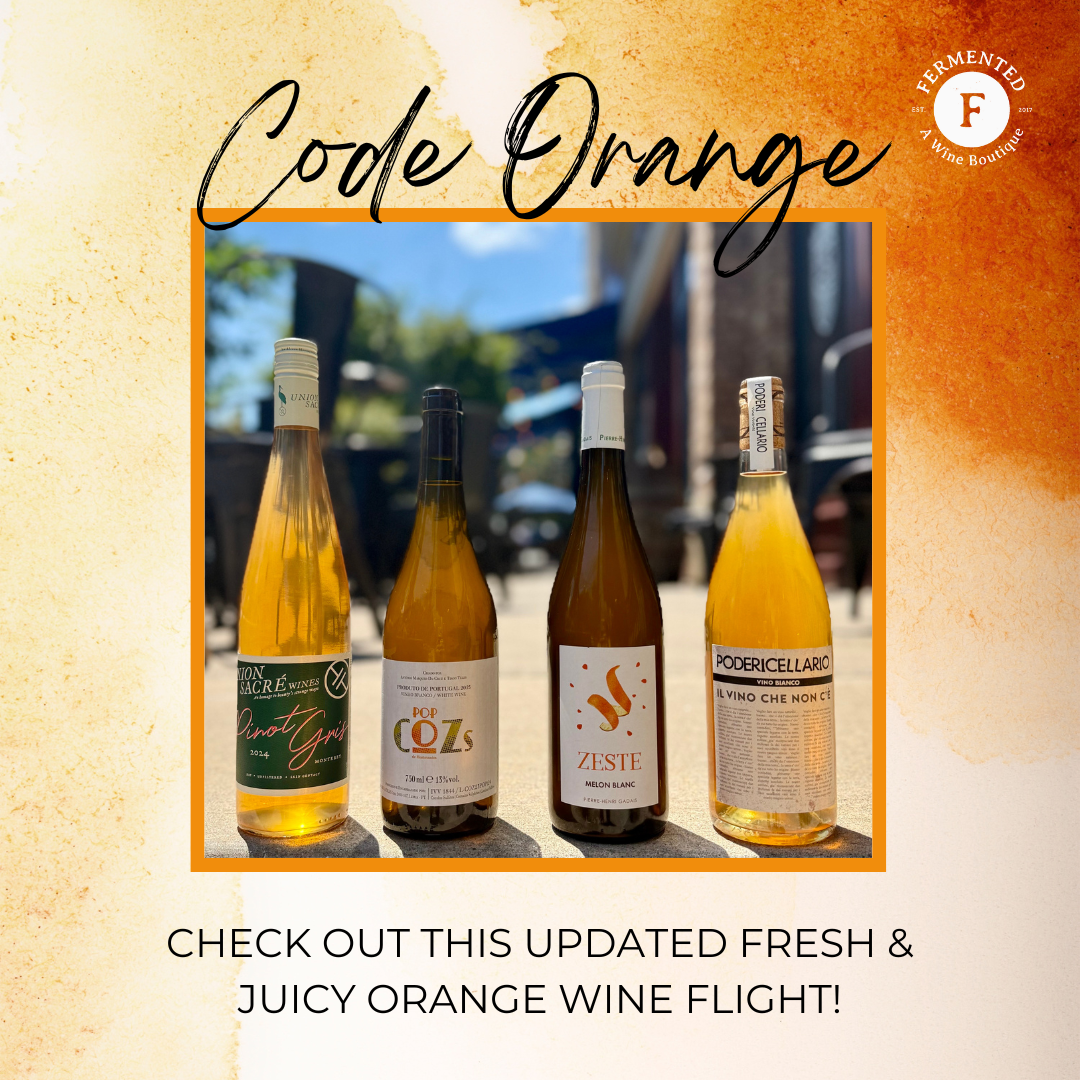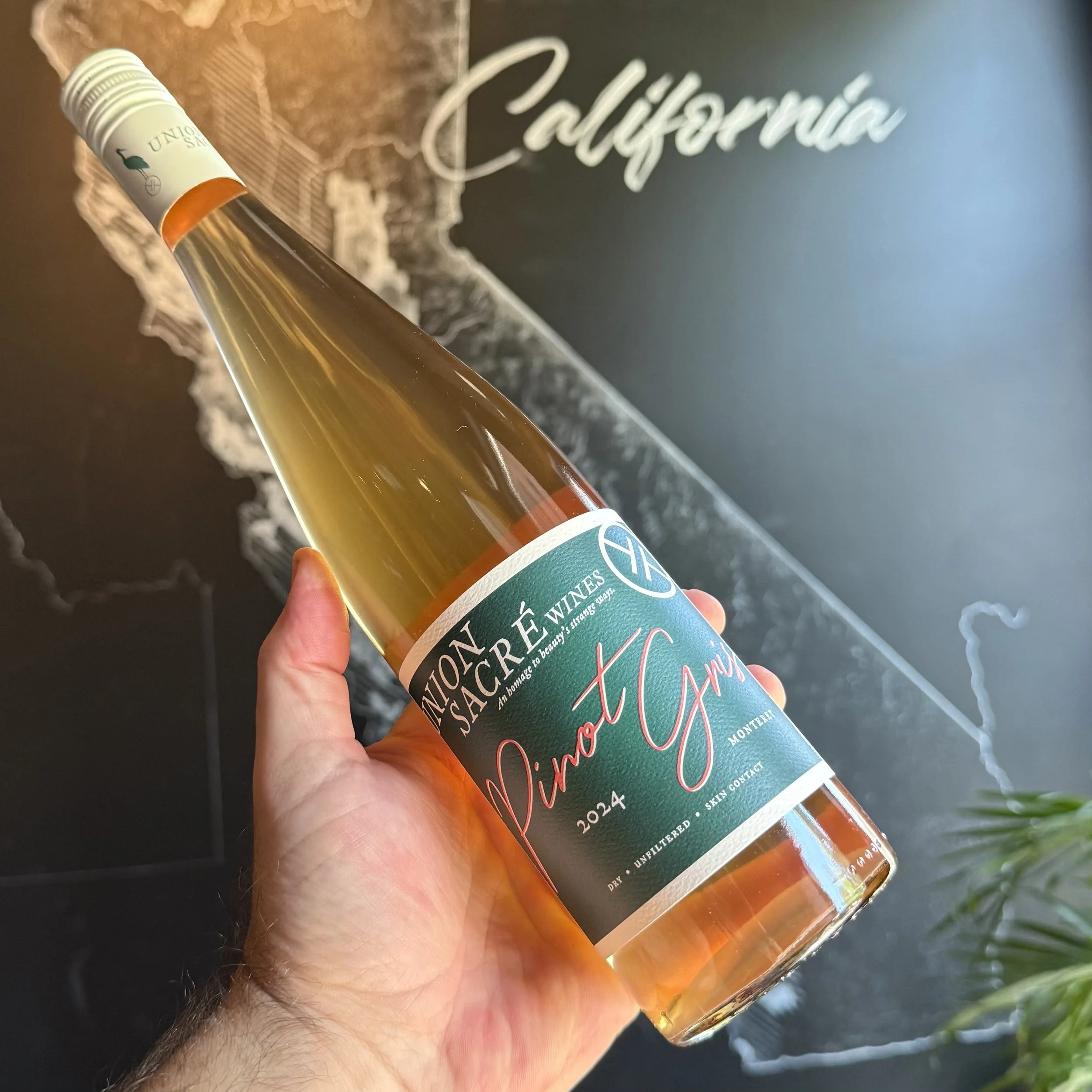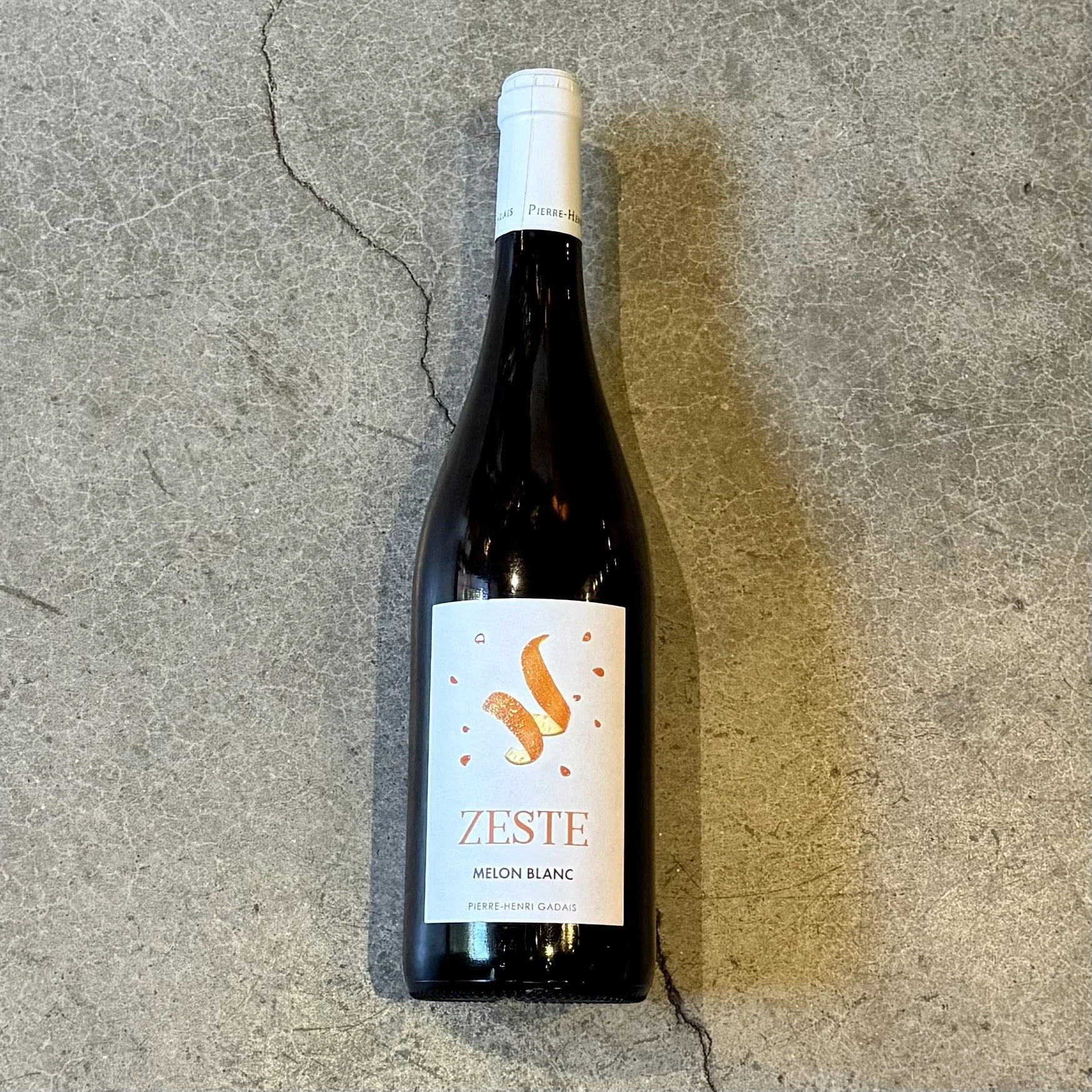Union Sacre Pinot Gris
Grapes 100% Pinot Gris
Place Monterey, California
Process 100% Destemmed. Skin contact for 20 hours and aged on the lees for 6 months in stainless steel. Bottled without fining or filtering.
Family These wines are made for the tables of friends, by two friends, from different continents, Xavier and Philip, who arrived at the Central Coast from opposite ends of the Earth. Xavier is a WSET certified, oenology degree holder from France, Philip is a self-taught designer from Michigan who kind of misses living in a van.
Between the two of them, Xavier and Philip have 35+ years experience working in Central Coast wineries. Xavier has made wine with some of the Central Coasts most luminous wineries. Philip cut his teeth at Proof Wine Collective.
Bottle: $29 | Glass: $13
COZ’s ‘Pop’ Vinho Branco
Grapes 100% Vital
Place Lisbon, Portugal
Process They use organic viticulture practices and native yeasts for fermentation. The grapes are hand-harvested and undergo a 4-day skin contact fermentation in concrete vats before being bottled without filtration.
Family COZs is a partnership between two of the most brilliant vignerons/winemakers from Portugal, Tiago Teles (Gilda, RAIZ) and Antonio Marques-da Cruz (Quinta da Serradinha). The idea of working together started in 2015 when they approached the family of the late Jose Mendonça about working their vineyard in Figueira da Foz, a village north of Lisbon. This place was the main source of the grapes of Quinta dos Cozinheiros, the producer of a wine that become a reference point for the new generation of winemakers in Portugal, and which unfortunately came to an end with the tragic and untimely death of Mendonça. This vineyard, located just 5 miles from the Atlantic, proved ideal for the wines of Teles and Marques-da-Cruz. Its 50 year old vines of Baga and slightly younger vines of Maria Gomes and Arinto are co-planted on clay-limestone soils and farmed organically. The proximity to the coast keeps the heat at bay and the grapes find great balance between ripeness and minerality.
Spurred by the success of their first vineyard, Tiago and Antonio purchased a 2-hectare vineyard in the Serra de Montejunto, a mountain range also in the region of Lisbon. This 35 year-old vineyard is planted on clay-limestone soils with Vital, a white varietal. Here too the farming is organic. They are not stopping here and are in the process of acquiring another vineyard in Lisbon planted with old vines of Baga.
Bottle: $35 | Glass: $15
PoderiCellario ‘Il Vino Che Non C’e’ Vino Bianco
Grapes 80% Nascetta, 20% Cortese/Favorita
Place Piedmont, Italy
Process Spontaneous fermentation with 2 to 3 months of skin maceration in Amphora. Aged in Amphora. No filtering or fining and minimal sulfur added if necessary.
Family Fausto and Cinzia Cellario are 3rd generation winemakers in the village of Carru` on the western outskirts of the Langhe. The family believes in only working with local, indigenous Piemontese grape varieties and fiercely defends local winemaking traditions both in the vineyard work and the cellar practices. The Cellario vineyard holdings cover some 30 ha between 5 different vineyard sites covering the southern Langhe. With holdings in Novello and Monforte, the Dogliani plot is arguably the family’s most prestigious land and I would consider them Dolcetto specialists. Vineyard work is organic (soon to be certified) and all the fermentation take place with indigenous yeasts. Sulfur is only added in tiny quantities at bottling if necessary (a practice not common with a winery in this mid-size range).
Bottle: $37 | Glass: $16
Pierre-Henri Gadais ‘Zeste‘
Grapes 100% Melon de Bourgongne
Place Loire Valley, France
Process The whole grape clusters were placed in concrete tanks and macerated for 12 days. Fermentation begins spontaneously using only the naturally occurring indigenous yeasts. On the 13th day, the whole clusters were pressed, and the juice transferred to used 600L French oak barrels to complete alcoholic and malolactic fermentation. Aged for 8 months in French oak. Bottled without fining or filteration.
Family .Descended from the Bourgeois family (Domaine Henri Bourgeois) in Sancerre on his mother’s side and the fifth generation of the Gadais family (Gadais Père et Fils) to produce wine from the rolling hills surrounding Saint-Fiacre-sur-Maine, Pierre-Henri was perhaps destined to be a vigneron. In the Muscadet region the Gadais family has long been synonymous with high quality production, with legendary importers Frank Schoonmaker, Robert Chadderdon, and now Peter Weygandt bringing the wines of Gadais family to the United States.
Growing up in the vines and cellar of his father and grandfather, Pierre-Henri received quite the education from a very early age. It would have been easy to return to the family Domaine after earning his Viticulture & Enology degree in Burgundy, but Pierre-Henri chose a different path. To gain a better understanding of the international wine trade, he studied Wine Business in Bordeaux for 2 years, followed by a year in California working in wine distribution. After the completion of his studies, Pierre-Henri worked for several years as an apprentice winemaker in Australia, Switzerland, Burgundy, Pomerol, Sancerre, and back in Muscadet at Domaine de la Pépière.
Finally in 2016 he returned to Saint-Fiacre-sur-Maine to work with his father Christophe at Gadais Père et Fils. However, simply coming into the family business was not enough for the talented young vigneron and soon Pierre-Henri was looking to start a project of his own. The perfect opportunity came in the form of Les Grands Presbytères, a nine-hectare Domaine started in the 1920’s by the Marzelleau family. In 2009 Nelly Marzelleau, the current generation, was looking to step back from the day to day running of Les Grands Presbytères and contracted with her neighbor, Christophe Gadais, to farm the vineyards and make the wines. From the 2009 to 2015 vintage, Christophe Gadais made the wines for the Marzelleau family under the Les Grands Presbytères label. In 2016, with the blessing of his father, Pierre-Henri purchased the vines and the cellar, rechristening it Domaine de la Combe.
Immediately Pierre-Henri began the task of enhancing the unique terroir and reorganizing the Domaine towards the production of multiple quality-oriented cuvees. He later added some adjoining parcels, bringing the total to 15 hectares. Domaine de la Combe is unique in that all the Domaine’s vines are in a single block. The vines lie within the lieu dit of La Pétière, and rest on a gentle hillside known as the Butte de la Combe. There are 3 distinct terroirs in the Butte de la Combe: orthogneiss on the summit, gneiss on the southern slopes, and schist on the northern slopes. The Domaine has a good mix of young and old vines with the oldest being planted in the 1950’s and youngest as recent as 2016. The spraying of herbicides and pesticides was stopped in 2016 and the conversion to Organic viticulture began in 2017. Work in the vines is done according to the lunar cycle and, as of the 2021 vintage, all the Domaine’s holdings are certified Organic.
Bottle: $35 | Glass: $15





